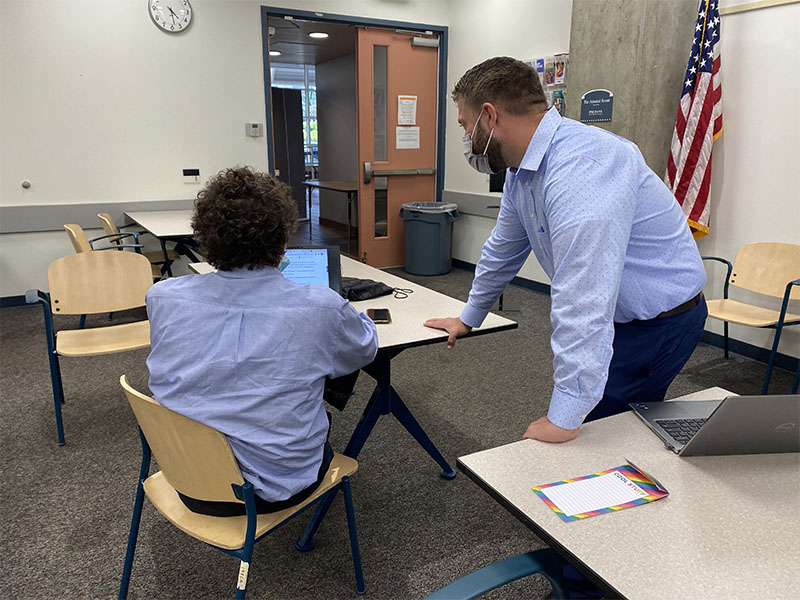Notes from the President
Chris Gray, Ph.D. | Founding President, Erie County Community College of Pennsylvania
Watching the Olympics every four years, I find myself marveling at the amount of strength and focus it takes for these trained athletes to leap effortlessly over a series of hurdles without losing speed or momentum. Even having practiced for thousands of hours, this remains an event that takes amazing coordination and skill.
How does this relate to a community college? I’m glad that you asked. Higher education unwittingly sets barriers for students that can be insurmountable. The first and perhaps most significant is that many community college students arrive at our institutions not knowing “how to college.” It’s not a skill that anyone is born knowing how to do. And yet, it is often taken as a given.
Unwittingly, higher education has devised systems that presuppose extant knowledge of how it’s supposed to work here in academe. It imagines an ideal student — one who is academically successful and the child of college graduates — and creates a model designed for this ideal. It imagines that students arrive college-ready, academically prepared, and with enough money to afford tuition — or at least, how to go about applying for financial aid and navigating the appurtenant complexities. It imagines that students know how to study and have the entirety of their lives available to do nothing more than immerse themselves in learning.
The reality, as we have seen, is often quite different. Community college students often are the first in their families to pursue post-secondary education. They often have no idea how to begin to apply for scholarships or need-based financial aid. They often arrive underprepared for the rigors of college work only to find non-existent support or insurmountable course prerequisites designed to act as gatekeepers. They find themselves working with busy, overtaxed faculty who are unaware of their struggles. They often are unaware of student support services like tutoring, access and disability services, and supplemental instruction. They find themselves facing a system designed for someone else; it’s a system that works to exclude.
They arrive, as it were, and feel that they are cast adrift to navigate this foreign landscape alone. They arrive lost. This, my friends, is arguably the biggest hurdle — or barrier — to be overcome by many of our students. They often fly under the radar, going from the bus stop to class and back to the bus stop. They face challenges of which we remain blissfully unaware. They suffer in silence. And then we lose them for any variety of reasons.
They may take too many classes without accounting for their existing work and family responsibilities, only to feel overwhelmed and have to drop, which results in a loss of both time and money. They may not know how to study or be prepared for the kind of higher-level critical thinking skills mandated by college work. They may have an undiagnosed learning disability that impedes their ability to succeed and not realize that the Americans with Disabilities Act (ADA) guarantees them the right to reasonable accommodations to help foster their success. They may not realize that they have to take steps to withdraw from their classes and simply stop attending, resulting in grades that are devastating to their academic progress only to find that student loan interest nonetheless continues to aggregate unforgivingly. They may have any number of noncognitive challenges that we will discuss in a future post. There are as many reasons as there are students. All of these are barriers, or hurdles, in the gauntlet thrown down before college students.
Reaching out to and finding this vulnerable population BEFORE we lose them is what we are all about here at EC3PA. To this end, we have worked diligently to connect with each student individually to support and guide them, and be on the lookout for pitfalls to help students avoid them upfront. Recently, an employee shared about a student she met at a local fast food restaurant who desperately wanted to enroll in the community college. However, the student was homeless and couldn’t prove residency (yes, homeless people often hold jobs and often want to better their circumstances!). This is a barrier that can be overcome. Remember, the system is built and assumes all students have similar circumstances (a permanent residence in this case). We are now working with the student to ensure that she has the necessary stability to be successful in higher education as homelessness brings its own set of challenges. These are the types of challenges that EC3PA welcomes; we are here to meet students where they are!
The comprehensive community college is an open-access institution, and it’s one that thus should be available to all comers. With the right support, anyone should be able to realize an educational objective, which is what we promise to provide to our students. We believe that the hurdles should be an Olympic event showcased every four years, not a way of life for students.

